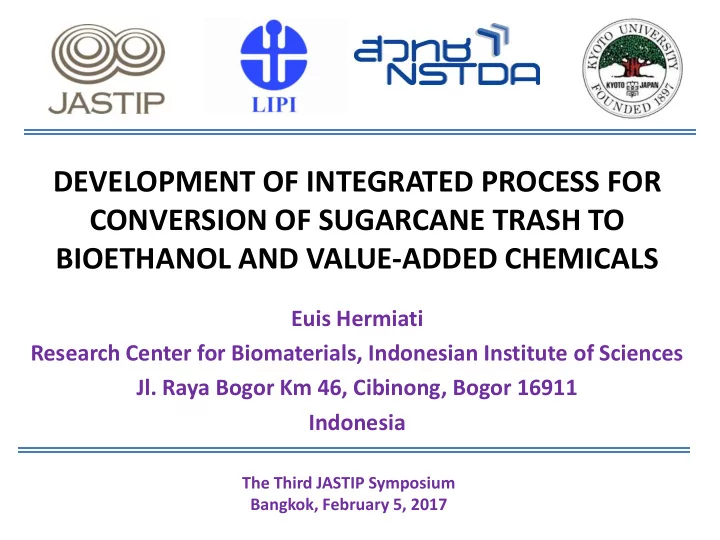

DEVELOPMENT OF INTEGRATED PROCESS FOR CONVERSION OF SUGARCANE TRASH TO BIOETHANOL AND VALUE-ADDED CHEMICALS Euis Hermiati Research Center for Biomaterials, Indonesian Institute of Sciences Jl. Raya Bogor Km 46, Cibinong, Bogor 16911 Indonesia The Third JASTIP Symposium Bangkok, February 5, 2017
RESEARCH MEMBERS RC Biomaterials & RC BIOTEC, NSTDA, RISH & IAE, Kyoto Chemistry - LIPI, Thailand University, Japan Indonesia • Euis Hermiati • Verawat Champreda • Takashi Watanabe • Widya Fatriasari • Pattanop • Hiroshi Nishimura Kanokratana • Triyani Fajriutami • Satoshi Oshiro • Pornkamol Unrean • Sita Heris Anita • Masato Katahira • Benjarat • Muhammad Ghozali • Takashi Nagata Bunterngsook • Raden Permana Budi • Keiko Kondo • Aphisit Poonsrisawat Laksana • Hideaki Ohgaki
BIOTECHNOLOGY & BIO-Based Economy BIO -industry and bio- Fuels: Ethanol (E10/E20/E85), processing are key drivers on the biodiesel (B5), Adv biofuels establishment of the sustainable BIOECONOMY Energy: heat, steam, electricity Bioresources are explored as renewable starting material and as a pool of genetic resources providing “converters” and Chemicals: “catalysts” for competitive commodity & specialty industry Materials: Bioplastics (PBS, PLA) & Enzyme & Genes & Microbes & biomaterials Biocatalyst Pathways Microcosms
Reformation of Bio-refinery and Bio-industry More 1 st G feedstock In Thailand More 2 nd G feedstock 8.8 16.8 Mt sugar/year 53 Mt bagasse/year 4.9 Mt cassava pulp/year 5.3 7.3 Mt starch/year 8 9.5 Mt chip/year Multi-disciplinary valorization & Waste management NEEDED However… EV car Maximized utilization (finding more secure electricity resources ? ) • Biofuels • Biochemicals Local biofuel industry will soon be • Biocomposites reformed to integrated biorefinery • Biospecialties with more product spectrum to Zero-waste process increase competitiveness and fully Sustainability & competitiveness utilize existing and future facilities Value extraction from biomass + indirect impact on waste management
BACKGROUND Depletion of fossil fuel energy Drawbacks in the utilization of fossil fuel energy Biorefinery concept Utilization of all major components of lignocellulosic materials for energy and value-added products Development of integrated process for conversion of sugarcane trash to bioethanol and value-added chemicals Efficient method for pretreatment and fractionation of biomass Effective enzyme system for saccharification of pretreated biomass
MATERIALS Sugarcane Trash Sugarcane Production in million tonnes (FAOSTAT, 2016) Year Indonesia Japan Thailand 2012 28.7 1.1 98.4 2013 28.4 1.2 100.0 2014 28.6 1.2 104.0
Chemical Compositions of Sugarcane Trash 10.8 2.2 15 Water extractives Ethanol extractives Cellulose Xylan 20.6 Arabinan 28.4 Galactan Lignin Ash 1.3 15.9 2.3 Zhang et al. (2016)
RESEARCH PLAN MATERIALS Sugarcane Trash Collected from sugarcane factory in Indonesia and Thailand Drying & Grinding
Biomass Pretreatment and Fractionation Approach: Development of low energy pretreatment & fractionation processes with recoverable solvents and chemicals to improve biomass digestibility and separation of components Solvents system • Aqueous (Liquid hot water) • Organic solvent (Organosolv) Catalysts/Promoters • Mineral acids v.s. organic acids • Inorganic v.s. organic bases • Liquid v.s. solid catalysts Solvent recycling and process design
METHODS Sugarcane Trash Pretreatment Centrifugation Hemicellulose Sugars Fermentation and/or Filtration (including Xylose) Ethanol, Xylitol Hemicellulose-free Biomass Enzymatic Hydrolysis Centrifugation Adhesive, Lignosulfonate, Lignin and/or Filtration Surfactant Glucose Fermentation Ethanol
EXPECTED RESULTS Providing innovative technology for conversion of sugarcane trash to biofuel and value-added chemicals. Improving capacity building of researchers from ASEAN member countries. Strengthen research collaboration on science and technology between Japan and ASEAN researchers Publications in international journals.
ACKNOWLEDGEMENT JST JASTIP Kyoto University NSTDA LIPI
THANK YOU for your attention
Recommend
More recommend